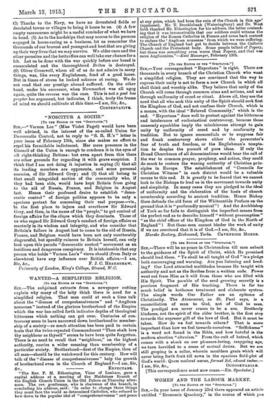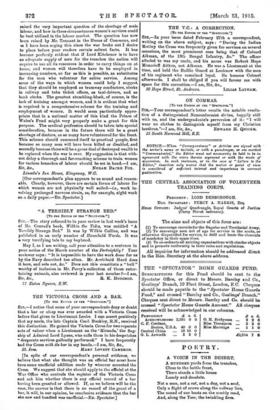WOMEN AND THE LABOUR MARKET.
[To TEE Errron or nor ntarrorrror."]
Sut,—In your issue of January 23rd there appeared an article entitled " Economia Quackery," in the course of which sou
raised the very important question of the shortage of male labour, and how in these circumstances women's services could be best utilized in the labour market. The question has now been raised by Mr. Tennant in the House of Commons, and is I have been urging this since the was broke out I desire to place before your readers certain salient facts. It has become perfectly evident that if Lard Kitchener is to have an adequate supply of men for the trenches the nation will require to use all its resources in order to carry things on at home, and women will therefore have to be employed in increasing numbers, so far as this is possible, as substitutes for the men who volunteer for active service. Among some of the ways in which women could help I suggest that they should be employed as tramway conductors, clerks in railway and tube ticket offices, as taxi-drivers, and as bank clerks. The greatest stumbling-Week, of course, is the lack of training amongst women, and it is evident that what is required is a comprehensive scheme for the training and employment of women. It would seem particularly appro- priate that in a national matter of this kind the Prince of Wales's Fund might very properly make a grant for this purpose. The medical profession should be taken into special consideration, because in the future there will be a great shortage of doctors, as so many have volunteered for the front. This scheme should commend itself to practical people, first because so many men will have been killed or disabled, and secondly became there will be a great deal of destroyed wealth to be replaced when the war is over. My suggestion is that with- out delay a thorough and far-reaching scheme to train women for various branches of labour should be set in hand.—I am,
Lincoln's Inn House, Eingsway, WC.
[Our correspondent's plan appears to us sound and reason- able. Clearly, however, there are certain forma of labour for which women are not physically well suited—i.e., work in- volviug prolonged nervous strain, as, for example, night work on a daily paper—En. Spectator.]



































 Previous page
Previous page